Load-bearing Exoskeleton Idea Scores at Medical Grand Challenge 2020
The fourth edition of the NUS Medical Grand Challenge (MGC) took place online for the first time on 28 August. This year’s top team, ARMAS, tells us more about their experience.
Organised by the NUS Yong Loo Lin School of Medicine, the MGC started in 2017 aims to inculcate a spirit of inquiry and hone problem-solving instincts among NUS Medicine undergraduates, while encouraging creativity and entrepreneurship. The multidisciplinary nature of the competition also seeks to foster collaborative teamwork among students from different faculties and backgrounds. Over the past year, these students underwent interdisciplinary boot camps to develop and refine their proposed solutions and prototypes, designed to address a number of existing healthcare problems.
At the finale, innovative solutions from 21 teams were assessed by a panel of judges representing a variety of industries such as information technology, healthcare and engineering. Each team brought their proposal to life with prototypes and pitched their ideas. Judges assessed these solutions using criteria that included impact on healthcare, innovation, business strategy, marketing and commercialisation potential.
Team ARMAS bagged the top prize in the Open Category, having wowed judges with a soft robotic suit, that is able to augment muscle functions and apply torque to the shoulder and lower back. This winning innovation has one important goal—help and protect nurses and other staff who may have to lift heavy loads. Besides clinching the top prize, they won the hearts of the audience with the People’s Choice award, which is determined by the audience’s vote. We sat down with the team to find out what the process of participating in the MGC was like for them.
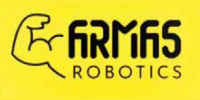
Members of Team ARMAS
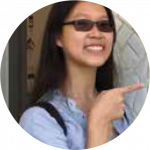
LYDIA CHONG CHING YEE
NUS Medicine
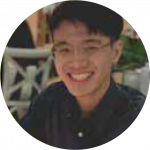
CHRISTOPHER MARK KUEK
NUS Medicine
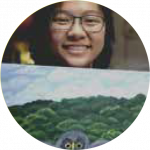
LIN JINGWEN
NUS Nursing
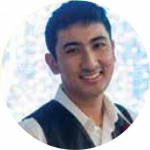
RUSTAM SHARIQ MUJTABA
NUS Pharmacy
Q: Share with us a little on the background of the team members. How did you all end up coming together for this project?
A: The ARMAS team consists of Lydia and Christopher from NUS Medicine, Jing Wen from NUS Nursing and Rustam from NUS Pharmacy.
We came together united in our passion for healthcare innovation, and we all care very much about the sacrifices nurses make every day to provide the best care for patients. In this time of COVID-19, we hoped that our project would encourage our healthcare heroes, and hopefully alleviate some of their burden.
Q: What does ‘ARMAS’ mean?
A: It actually refers to ‘arms’ in Tagalog. The name was chosen by our mentor, Mr Rainier Natividad, who is Filipino. He probably came up with this name because the project is about lifting heavy loads.
Q: What prompted you to participate in this year’s MGC?
A: The MGC is an excellent platform to learn about healthcare innovation and it empowers students to contribute to the healthcare industry. Some of us were inspired to join after watching 2019’s MGC and some of us wanted to explore and discover what healthcare innovation was all about. Innovation allows the healthcare system to continuously improve. As future healthcare professionals, we believe that it is never too soon to get involved in this process.
Collectively, we shared a curiosity to learn beyond the undergraduate curriculum and a passion to help improve the current healthcare system. This is what spurred us to join this year’s Challenge.
Q: Describe your journey and experience with the MGC this year.
A: We had a rocky start as our market research and validation studies had to be completed at the height of the COVID-19 pandemic. We did not have the opportunity to meet up with one another, let alone conduct interviews with other parties. It was also challenging to find nurses to interview, especially those from nursing homes, as they were busy working at the frontline. Thankfully, several nurses were willing to take time out of their hectic schedules to share their invaluable opinions and feedback on the exoskeleton.
It was a tough journey: having to work on the MGC deliverables while making time to study for tests and exams. It was even harder to find a common time to meet up, with our conflicting schedules. Fortunately, our mentor, Mr Rainer Natividad, was willing to meet us after hours, sometimes even at 10pm, to give us advice.
Despite these struggles, we still felt that the whole experience was meaningful and worthwhile. We got to experience what healthcare innovation was like— from identifying a problem, conceiving an idea, to executing it. We also learned from the many brilliant minds in the industry: our mentor, the speakers at the workshops, and the judges on Finale Night!
“The whole experience was meaningful and worthwhile. We got to experience what healthcare innovation was like—from identifying a problem, conceiving an idea, to executing it. We also learned from the many brilliant minds in the industry: our mentor, the speakers at the workshops, and the judges on Finale Night!”
Q: What was the deciding factor in choosing to work with Mr Rainier Natividad? What was the working experience with him like?
A: He is a PhD candidate with NUS Biomedical Engineering. His work was one of the projects offered under the Tech Mentor Programme by the MGC Organising Committee. As a young professional in the field of science who is also interested in healthcare innovation, his goals aligned perfectly with ours.
ARMAS was his brainchild which he had pitched at an innovation and entrepreneurship competition under his mentor, Associate Professor Raye Yeow. Having been fascinated by robotic suits since a young age, Mr Rainier wanted to explore the use of exoskeletons in the age of wearable robotics to help ease the load of nurses. At that point, it was a conceptual design that had not been fully explored. He shared his vision for ARMAS with us, which resonated deeply with us as future healthcare professionals. This made us want to work with him to further develop ARMAS and hopefully push it towards entering the market as soon as possible.
He was able to give us technical advice along the way and shared his experience working in the industry. He even gave us tips on how to pitch ARMAS effectively at the finale. We are blessed to have learnt so much from Mr Rainier and the opportunity to work with him even though he is from a different faculty.
“We are thankful for the immense support from the MGC judges and audience members. The First Prize award from the Open Category and People’s Choice award serve as both a morale and financial boost to take this project even further.”
Q: How did the team feel about the pitch to judges, and winning the competition?
A: We were optimistic that we would reach the finals because we truly believe that ARMAS is an idea of substance and represents a cause worth fighting for. We were hopeful that the audience would share the same sentiment, as ARMAS tackled a commonly overlooked problem. We therefore, made extensive preparations for the finals, such as rehearsing our pitch and oral defense. That said, we never expected to win and we are extremely surprised and very grateful for the support for ARMAS!
Q: Will we see ARMAS in action?
A: We are thankful for the immense support from the MGC judges and audience members. The First Prize award from the Open Category and People’s Choice award serve as both a morale and financial boost to take this project even further.
Once COVID-19 restrictions are lifted, we hope to conduct further interviews with nurses and seek out opportunities for them to try the suit and provide their feedback. Ideally, we would be able to get better awareness and recognition for ARMAS, especially if we are able to secure funding to further develop the suit and its capabilities. If we are able to achieve all this, we will then look to send a letter of intent to healthcare institutions, especially nursing homes and community hospitals, for pilot testing.
MGC 2020 Factoids
Competing in two categories this year, teams in the Nascent Category presented proposed solutions to a clinical problem or unmet healthcare need they identified and tackled from scratch. Meanwhile, the Open Category saw teams working on projects initiated by industry experts who guided them as “Tech Mentors”, or improved on ideas offered in previous competitions. Participants in the Open Category also included international teams who have previously participated in other similar competitions elsewhere.
This year’s teams comprised students from various NUS faculties, across Medicine, Nursing, Arts, Business, Computing, Engineering, Science and Law, and their counterparts from Nanyang Technological University (NTU), Yale-NUS, Singapore Management University (SMU) and Singapore University of Technology and Design (SUTD). The Finale also welcomed visiting teams from the University of Utah, National University of Ireland Galway and Korea University College of Medicine (KUCM).
Prizes for winners in the Nascent Category were sponsored by the Tan Ean Kiam Foundation.
|
Prize |
Quantum |
|
Nascent Category |
|
|
Open Category |
|
|
People’s Choice |
|
